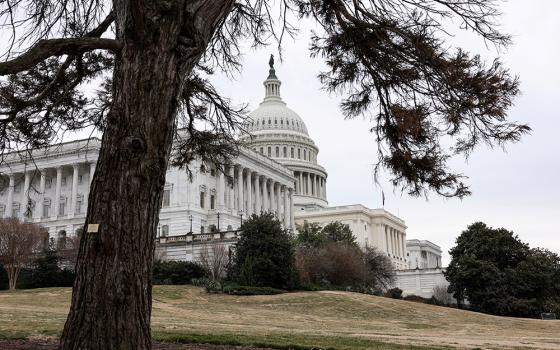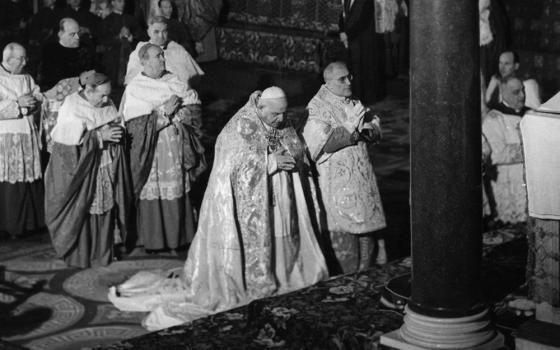
(Unsplash/Suzanne D. Williams)
In his Sept. 3 Atlantic article, Jeffrey Goldberg documents the president's contempt for those who give their lives for a cause that does not benefit them in any way. He speaks of them as losers — suckers. Goldberg writes, "Trump simply does not understand non-transactional life choices."
This aspect of Donald Trump's leadership style has stayed with me and greatly disturbed me. Making choices only when the outcome will benefit the person him or herself seems to reflect one of the earliest stages of Maslow's hierarchy of needs — commonly described as "you scratch my back, I'll scratch yours."
When I looked up "transactional leadership" in Wikipedia, other dimensions of this kind of leadership resonated with how the president behaves. It described this type of leadership as that which does not look to change the future; rather it keeps things the same. It best motivates people for the short-term with a system of rewards and punishments, paying attention to their followers' work in order to find faults and deviations.
This type of leadership certainly has existed through the centuries. However, as we have evolved as cultures, as nations and as individuals, we have understood that serving the common good of our planetary community demands a much different kind of leadership.
Today, the global community is faced with the breakdown of the economic, political, cultural and religious structures/systems that have served us these past centuries — but that are now the problem.
The very values and beliefs that helped develop market capitalism — bringing many societies out of poverty — and that developed in many of us a pride in our individuality and achievements have been taken to the extreme and have brought us to this point.
Silo thinking is destroying the species. Where there is hope is in the emergence of a new structure of consciousness that could integrate us with the greater whole.
Our future needs transformational leadership, not leaders who contribute to the increasing breakdown by pretending we can go back. Our future needs transformational leadership that can call forth a renewed sense of altruism emerging out of this highly individualistic and technologically sophisticated era.
Science and mysticism might offer us some help in this area. Quantum physics, which appeared first in the turn of the 20th century, has been seeping into our lives with or without our noticing it. It has turned the classical scientific worldview in which we are immersed upside down. That linear, mechanistic and deterministic paradigm has shaped the way we have understood and structured the way we do economics, politics, education, health care and the like. The result over these past centuries has been a fragmentation of how we do things and even who we are in relation to the "other."
We have conceived of ourselves like silos: operating independently of each other and believing that what went on in one silo had no effect on what was going on in any of the other silos.
Quantum physics is showing us that we are not silos. We are not isolated individuals, corporations or nations going about our business with no impact on anyone or anything else.
Rather, we are an interconnected web of life. There is a living quality to the world to which we seem blinded, and we need to awaken to this if we are to address the breakdown we are facing.
In the book The Quantum Revelation by Paul Levy, I find hope in what many quantum thinkers — including theoretical physicists like David Bohm and cultural philosophers like Jean Gebser — have been exploring. They write about how the fragmentation we experience and the thinking that keeps us inherently divided and disconnected contribute to preventing us from working together for the common good.
This silo thinking is destroying the species. Where there is hope is in the emergence of a new structure of consciousness that could integrate us with the greater whole.
COVID-19 is certainly bringing us face to face with how we are all connected. The global climate crisis testifies to how the reality of silo thinking — permeating all of our institutions — wrought the kind of devastation we are now facing. We cannot go back. We need to move forward.
We are all connected. We just are not awake to it.
We are in crisis mode and only transformational leaders will call us to a renewed commitment to work together for the common good.
Science is emerging with an old but perhaps unexpected partner in this call to a new consciousness. It is found in all the world religions in their mystical tradition. Many of those who practice contemplation and experience Divine Mystery in a more direct and intuitive way often express the insight that we are all one — we are all connected. We just are not awake to it.
Thomas Merton, a Trappist monk, famously wrote about his experience at the corner of Fourth and Walnut in Louisville, Kentucky:
I was suddenly overwhelmed with the realization that I loved all those people, that they were mine and I theirs, that we could not be alien to one another even though we were total strangers. It was like waking from a dream of separateness, of spurious self-isolation in a special world. ... And if only everybody could realize this! But it cannot be explained. There is no way of telling people that they are all walking around shining like the sun. ... If only they could all see themselves as they really are. If only we could see each other that way all the time. There would be no more war, no more hatred, no more cruelty, no more greed.
Constance FitzGerald, a cloistered Carmelite, writes extensively on the experiences of contemplation. In her reflection "From Impasse to Prophetic Hope: Crisis of Memory," she reflects on the importance of this shift of consciousness. "It is my strong suspicion that ... an essential change in selfhood, may be emerging with such frequency as a response to a world driven by selfishness and self-concern. Any hope for new consciousness and a self-forfeiture driven by love stands opposed by a harsh reality."
Here she names serving our own interests, hoarding resources, ravaging the earth, scapegoating each other, killing, maiming, torturing. "Our ability to embody our communion with every human person on the earth and our unassailable connectedness with everything living is limited."
We need "to make the transition from radical individualism to a genuine synergistic community" she says. "The future of the entire earth community is riding on whether we can find a way beyond the limits of our present evolutionary trajectory."
Advertisement
Such a future needs transformational leaders to call forth in us new ways of addressing the common good amid difficult choices.
If the U.S. is first in obtaining a vaccine for COVID-19, do we join with those in the global community wanting to ensure that those most at risk receive it first, or do we make sure that everyone in the U.S. receives it first, regardless of risk?
Do those whose culture, sex and race have been privileged for centuries enter into real dialogue with those who have been forgotten, or do we stand firm and ignore the sufferings of so many?
Does the industrialized world — heavily dependent on fossil fuels — continue to choose profit over acknowledging its role in the climate crisis? Or do we as a global community make a commitment to renewable and sustainable forms of energy, so that we can try to reduce the increasing impact of the global climate crisis?
This is an election year and how we respond to our future depends on all of us and our elected leaders. May we choose wisely.
Let us pray with Nan Merrill's interpretation of Psalm 140, which offers us a piece of contemplative wisdom.
Are we not called to make Love conscious in our lives?
To divinize the earth with heavenly splendor? ...
That I might flow in harmony with the universe, and
be a bearer of integrity.
I know that You stand beside those who suffer, and
You are the Light of those imprisoned in darkness.
Surely You will guide us into the new dawn,
that we may live as co-creators with You!"
[Nancy Sylvester is founder and director of the Institute for Communal Contemplation and Dialogue. She served in leadership of her own religious community, the Sister Servants of the Immaculate Heart of Mary, Monroe, Michigan, as well as in the presidency of the Leadership Conference of Women Religious. Earlier, she was national coordinator of Network, the national Catholic social justice lobby. You may be interested in the current ICCD program, "Enter the Chaos: Engage the Differences to Make a Difference," offered online. For information go to iccdinstitute.org.]






